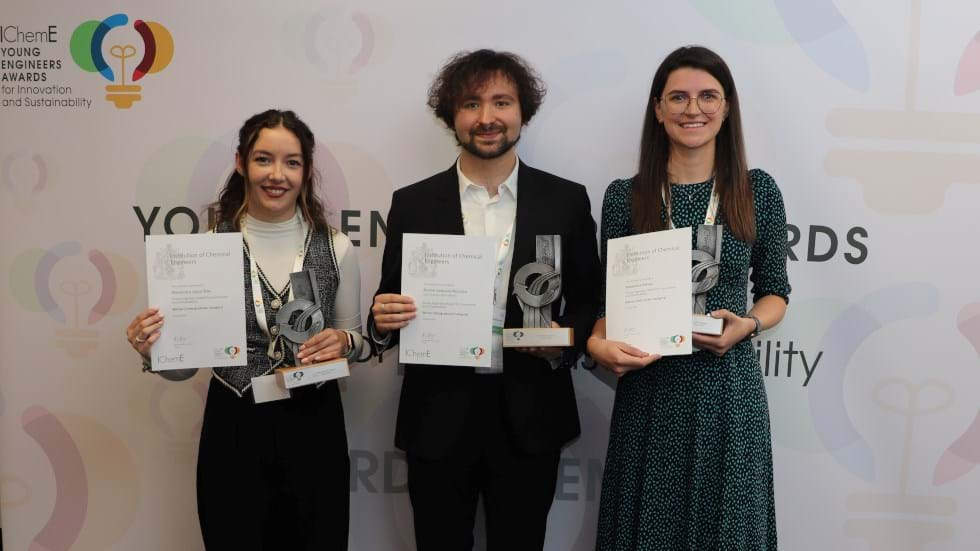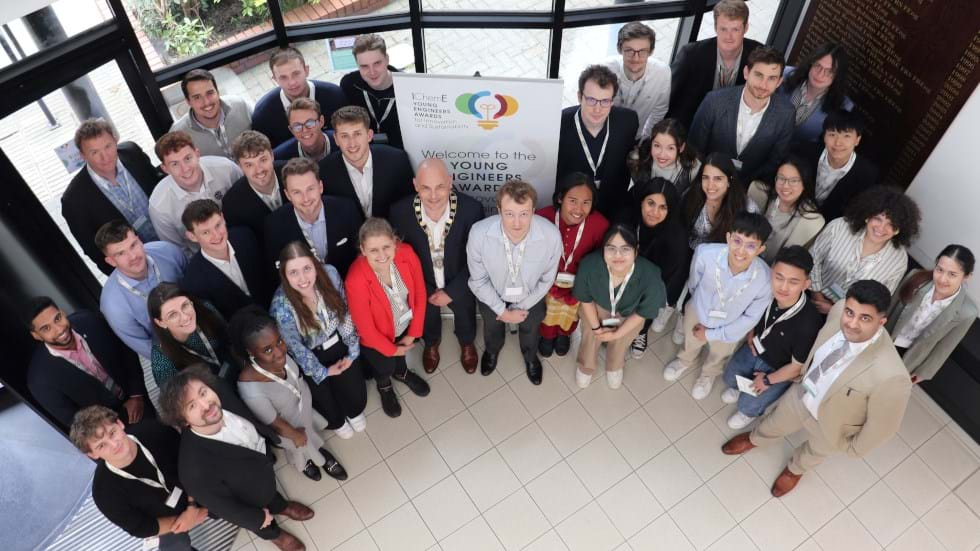AI-guided evolution, lower-carbon carpets and plastic recycling win out at IChemE’s inaugural Young Engineers Awards for Innovation and Sustainability

“I WANT the stuff I work on to make an impact. That’s everything I think engineering should be.”
So says Alexandra Joyce Roe, winner of the undergraduate prize at IChemE’s inaugural Young Engineers Awards for Innovation and Sustainability (YEAIS). Alexandra was one of four winners, alongside Roseanna Edney, Andrei Leonard Nicusan and Roberto Hart-Villamil, who were invited to IChemE’s UK headquarters on 28 June to showcase how their work is making a positive contribution to the UN’s Sustainable Development Goals.
The winners were selected from around 30 student and early career members who spent the day talking chemical engineers, including IChemE trustees and congress members, through poster presentations describing the projects, products, and research that they had entered into the awards.
“I've always been passionate about mathematics, physics, chemistry, and computer science,” says Andrei Leonard whose joint entry with Roberto won the postgraduate award. The pair are tapping into the principles of Darwinian evolution to optimise the designs of processing equipment and wind turbine blades.
“I wanted to do something that would join them all together and, well, the broadest degree out there, I think it's chemical engineering – as you can see from the variety of posters [on show today] and the career that I'm building right now. I'm effectively writing artificial intelligence algorithms for industry. And that's still chemical engineering. It's fantastic.”
The variety is indeed impressive. Wander from one poster to the next, and you find yourself talking to a researcher helping to develop fusion energy, another working on processes to strip hormones from wastewater, and then a few steps along is a team creating an app to scan your grocery receipts to track use-by dates, plan meals, and reduce food waste.
“I'm incredibly proud,” says Roseanna who won the early career award in recognition of her work at the process technology developer Plastic Energy where she is designing and building advanced chemical recycling plants for plastics. “It gives me a confidence boost that I am doing the right thing and I'm on the right track.”
Can’t stop smiling
I caught up with the winners on the sidelines of the event to ask why they entered and what their plans are for the future.
“I’m absolutely gobsmacked that I’ve won,” says Alexandra. “I can’t stop smiling.”
Her award is for a project she worked on with carpet manufacturer Milliken. Alexandra did a placement year at the firm as part of her bachelor’s at Loughborough University. When it came to a conversation about next steps for her integrated master’s project, Alexandra was certain she wanted to focus on sustainability so messaged her old boss to ask if there was an opportunity to come back.
“He loves seeing me develop, and he was always pushing for sustainability because it was one of his global targets. And he said yes, I'd love to have you back.”
Long story short, they threw around ideas for projects and narrowed it down to Alexandra investigating how biochar might be incorporated into Milliken’s carpet tiles to reduce their carbon footprint. Alexandra tested various samples and made material adjustments before hitting on an optimum recipe that in pilot trials reduced the carbon footprint of the tiles by 36%.
Alexandra has since left the project but says the company’s US headquarters are aware of the trials and happy with her work. She now plans to work in France and Germany, becoming fluent in their respective languages.
“That's where the sustainability giants are at the minute, so I want to be able to converse with them in their language...sustainability is my driver.”
Staying in operations
Roseanna chose to enter the awards for the opportunity to showcase the work of Plastic Energy whose thermal anaerobic conversion technology processes hard to recycle plastic into a synthetic oil that can be used to produce plastic again.
“I think we're going to be the key part of the transition to a circular economy. So, actually showing the work that I do – I am very proud of it – is actually really important to get more people on board with plastic recycling,” she says.
“We're in the final stages of constructing two projects. One in the Netherlands and one in France. I'm really enjoying troubleshooting design issues and trying to work out how we can solve problems. And also managing the risks associated with it and making sure that we are building a safe and sustainable plant.”
Asked where she sees her career going, Alexandra says: “I think I want to stay in an operating environment…It's important to have people in those roles and people pushing [sustainability] forward.”
Inspired by Darwin
Andrei Leonard, whose PhD research at the University of Birmingham has been spunout into a company called EvoPhase, says: “We've written these technologies to optimise industrial processes that we believe can have massive industrial impact in the real world. We recently had the first real validated case study where we had our AI predict a 500-time improvement in a process.”
The technique applies Darwinian evolution principles and applies them to industrial equipment using AI to come up with novel, more efficient designs.
“An evolutionary geometric design optimisation engine effectively can take geometries of real physical processes and optimise them to find much better shapes for any given purpose,” such as decreasing energy input or increasing mixing rate, he explains.
The team thought the predicted 500-fold improvement was “ludicrous” but sure enough, they 3D-printed and tested the novel ploughshare mixer design, and the prediction was proved right.
“I'm a strong believer that the science should be transparent and open and accessible to everyone, which is why the algorithms themselves, the computer science bit, I've published them all as open-source packages. They're all documented and easy to use and they are being used around the world.”
To maximise the commercial and real-world impact, EvoPhase will launch software as a service web platform so individual engineers at SMEs can begin to optimise equipment that was once only available to much bigger companies with very large research budgets.
Lessons learned for the next generation

With their awards won, what advice do they have for those engineers following in their footsteps?
“Focus on real-world impact and on communicating your results to the right audience,” says Andrei Leonard. He says he has fallen foul in the past of failing to tailor his message to the recipient.
“If I start talking about covariance matrix adaptation, evolutionary strategies, and global optimisation of derivative functions, it will come across horribly.” He says the awards ceremony has been a great opportunity to talk with people and practice framing what he does for his audience. “It's really an essential skill set.”
Alexandra says: “Don't worry about asking for help or clarity. Don't struggle on your own. Just because it's an individual project doesn't mean you have to do it all on your own.”
Roseanna says: “Don't hesitate to put yourself in these kinds of opportunities. If you don't succeed, you'll learn from it.”
“And also, don't be afraid to speak your mind because I think especially as a female engineer, you often don't feel confident enough to say things, but actually, normally there’s someone else in the room thinking the same thing. I think it's important just to put yourself out there and push yourself where you might not normally have because that's when you'll grow the most.”
The entries were judged by a panel of members drawn from the IChemE National Early Careers Group, whose chair Martin Wardrope joined IChemE president Mark Apsey to announce the winners and present the awards.
Addressing the room, Apsey says: “Inspirational is a word which is overused in today’s world – but it is truly inspirational to be in a room with so many young engineers showing how they are already making a difference and being the change. I am determined that, during my presidential year, we will shine an even brighter light on the impact of chemical and process engineering on people’s everyday lives as well as the big challenges of sustainability and climate change.”
For a full list of the winners, highly commended entries, and a selection of the posters displayed at the awards event, visit: https://www.icheme.org/about-us/news-releases/icheme-celebrates-first-ever-winners-of-young-engineers-awards-for-innovation-and-sustainability/
The 2024 awards was a UK pilot. Plans are now underway for the launch (provisionally September 2024) of annual regional programmes in the UK, Australia, and Malaysia. IChemE says more information will be released soon.
Recent Editions
Catch up on the latest news, views and jobs from The Chemical Engineer. Below are the four latest issues. View a wider selection of the archive from within the Magazine section of this site.




